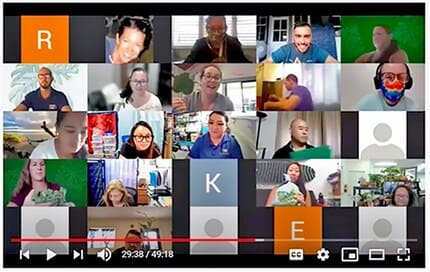Join the Movement
Everyone can support healthy futures. Find the role that’s right for you!
Dear Friends,
Reflecting on events from this past year has left many of us with questions about the role of public health in our lives. Yet this much remains clear: We have a collective responsibility as a nation to work together to advance a healthier generation of young people. As a leading children’s health organization, the presiding question for Healthier Generation remains: What does it mean to be healthy today and tomorrow?
2021 was a challenging year for delivering on our organizational impact goal of every mind, every body, every young person healthy and ready to succeed. COVID-19 continues to threaten our physical health, and communities are experiencing an unprecedented surge in demand for social-emotional and mental health supports. Re-exposed wounds of adversity, systemic inequities, and unrelenting toxic stress have especially plagued youth who identify as Black, Indigenous, and People of Color (BIPOC) as well as youth from under-resourced communities.
Bearing witness to the experiences of the past year allows each of us to reexamine and redefine ‘health’ in more equitable and inclusive ways, and deepen our resolve to uplift those who disproportionately shoulder the burden of this collective health crisis.
At Healthier Generation, the way forward is through integration. We define optimal health as cutting across multiple interrelated topics (whole child health) and we advance equitable solutions by working collaboratively with schools, families, and community partners to create safe, stable environments that support comprehensive well-being.
Unlike conventional approaches to improving health, an approach centered on equitable whole child health involves a deep examination of existing and needed supports for the mind and for the body, both at home and at school, and engaging stakeholders at all levels – putting them in the middle of the solution in the most culturally responsive way possible.
As you review our 2021 Impact Report, I hope you take pride in the role that each of you played in helping Healthier Generation deliver a meaningful response to an ongoing pandemic. With all that we have witnessed, redefining health for a healthier tomorrow, together, is critical to the next phase of our work — one rooted in integration and equity — to produce our healthiest generation yet.

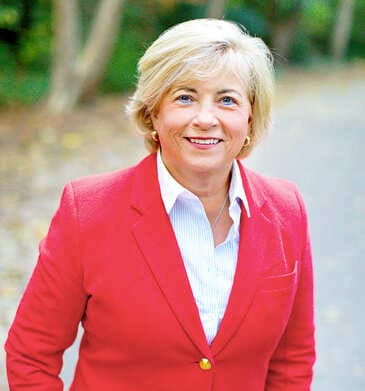
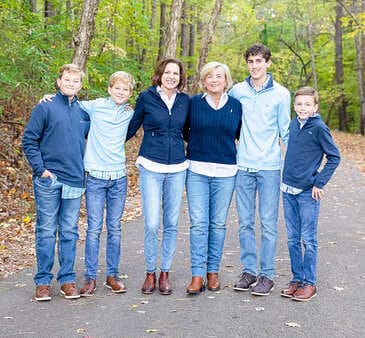
This year, Healthier Generation forged new and deeper connections with partners as we advanced an integrated approach to whole child health. This theme of integration resonated with me on a personal level, as my partner Sherry and I blended our families into a shared household. This photo is from one of our favorite places in Raleigh, NC where we often spend time exploring and having fun with our kids.
Healthier Generation engages schools and districts to advance policies and practices that improve the well-being of students, teachers, and staff, and boost educational outcomes. In 2021, with the support and partnership of Kaiser Permanente, Harmony SEL, the Centers for Disease Control and Prevention (CDC), and the CVS Health Foundation, we sustained and expanded our response to the surging demand for resources under three pillars of whole school health: social-emotional, physical, and mental.
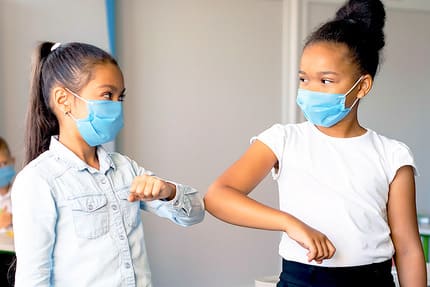
Through the Resilience in School Environments (RISE) initiative, supported by Kaiser Permanente, our content experts developed new resources, offered professional learning opportunities, and contributed to the revised Planning for the Next Normal at School playbook to meet the social-emotional needs of students, staff, teachers, and families. We also created a RISE “extender” model that provides training-of-trainers to partners who wish to disseminate RISE resources in new communities, expanding the reach and impact of this work.
In September, we launched another major project in partnership with Kaiser Permanente, the Thriving Schools Integrated Assessment, a comprehensive self-assessment tool that helps schools and districts identify and implement policies and practices that promote health and student achievement. Building on the RISE Index and previous Healthier Generation assessments, the Thriving Schools Integrated Assessment empowers educators to build action plans, access trainings and resources, and download reports to track progress against goals.
Healthier Generation and Harmony SEL continued their three-year partnership to increase awareness of the critical role that social-emotional learning plays in children’s health and development, disseminating Harmony’s proprietary resources to Healthier Generation’s robust national network of school wellness champions.
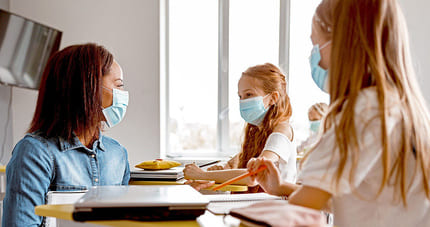
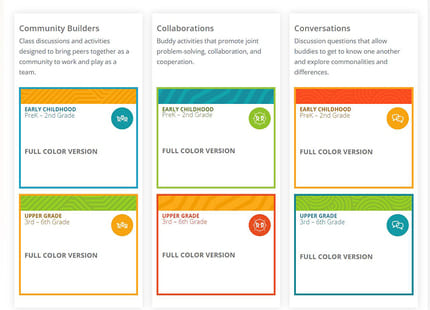
The COVID-19 pandemic has made it clear that schools play a critical role in supporting the health of the whole child. With support from the Centers for Disease Control and Prevention (CDC), Healthier Generation is providing schools with resources to foster students’ mental, physical, and social-emotional health and well-being. To date, Healthier Generation has developed ten resources and conducted nearly 50 professional development trainings on topics such as staff well-being, mental health literacy, building a positive and healthy learning environment, and virtual delivery of physical education and physical activity.
In addition, Healthier Generation and the CDC developed the Wellness Policy Builder, a one-of-a-kind digital tool that supports school districts across the nation in developing federally-compliant local school wellness policies tailored to the needs of their communities. This tool can be customized to meet the USDA’s Final Rule of 2016, which strengthened requirements on public involvement, transparency, implementation, and evaluation, as well as state or local requirements for local school wellness policies.
Staff well-being, stress management, and self-care have emerged as top priorities in the out-of-school-time space as well. Healthier Generation developed and delivered nearly 30 virtual trainings around social and emotional health to both national- and state-level afterschool networks in 2021.
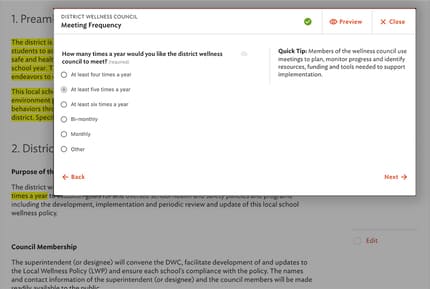
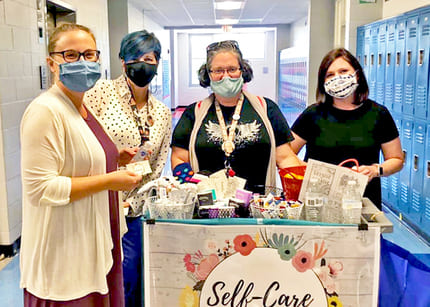
In 2020, Healthier Generation, the CVS Health Foundation, and the American Heart Association launched the Tobacco-Free Schools Initiative to strengthen equitable school policies and increase the adoption and use of restorative discipline practices. The highlight of the initiative was the development of an evidenced-based Tobacco-Free Model School Policy and accompanying training for districts on best practices. This landmark policy is the first-ever national set of guidelines to highlight and recommend restorative responses to tobacco use. Education and counseling replaced punitive practices like suspension that do little to curb the use of tobacco products and disproportionally impact students of color.
To date, this initiative has reached over 1 million students at schools in 33 districts, 82% of which are Title I schools that serve under-resourced communities.
Healthier Generation also created the Tobacco-Free District Assessment to identify opportunities for districts to strengthen their policies and practices, and developed free resources, trainings, and technical assistance to guide school leaders in creating sustainable change around tobacco policies.

Along with engaging schools, connecting with families is key to Healthier Generation’s mission of advancing children’s health. Over the last year, we have supported millions of families across the country with resources to promote healthy home environments.

Our Kohl’s Healthy at Home campaign delivers fun activities and free, bilingual resources to strengthen social-emotional health, physical activity, and healthy eating habits. The overwhelmingly positive response from parents and educators underscores the value and impact of this work: 97% of those surveyed found Kohl’s Healthy at Home resources useful in supporting and promoting healthy habits.
While working with caregivers and educators, we also took time to celebrate a few wins. This year, we recognized nearly 100 schools with the inaugural Kohl’s Healthy at Home Family Engagement Distinction, in honor of their commitment to family health and well-being. Schools like Palmer Elementary in Chicago demonstrated dedication, courage, and innovation that continues to inspire their peers across the country.
In addition, as communities and families navigated the health impacts of COVID-19, Healthier Generation and Kohl’s celebrated health champions who work to create a more just, equitable, inclusive, and healthy future for children and families.
To date, we have reached over 4 million families across the United States through Kohl’s Healthy at Home. This year marked an important extension of this collaboration, with Kohl's committing $5 million over three years to intensify support of BIPOC populations and Spanish-language resources.
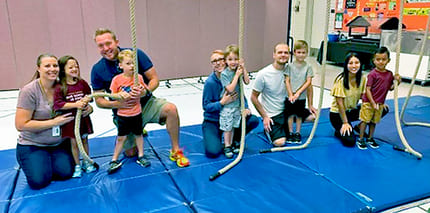
Since the start of the COVID-19 pandemic, many students have missed out on routine and recommended childhood vaccinations. Experts estimate that 20% of school-age children in the U.S. are now behind on shots to protect them from diseases like measles and chicken pox, according to the Learning First Alliance. The Kaiser Family Foundation reports that Black and Latino parents are more likely to encounter barriers to accessing vaccines like the COVID-19 shot than White parents.
In response to this crisis and with support from Merck, Healthier Generation launched an equity-centered hub of vaccine-related resources in August. These evidence-based fact sheets, videos, and exercises, many available in both English and Spanish, support schools in addressing systemic inequities by improving vaccine access, information, and confidence among families and caregivers.
Materials in the hub include a checklist of CDC-recommended vaccines, guidance on finding and updating vaccine records, and calming exercises to help children prepare for appointments. The hub also features a recording of a panel discussion on Promoting Vaccinations and Fighting Misinformation with Donna Crawford, a director of Healthier Generation’s Healthy Schools and Communities Program, as well as Chelsea Clinton, Senator Amy Klobuchar, and Dr. Céline Gounder.
Nearly 8,000 kids start vaping every day, according to the American Lung Association. When families are equipped with the knowledge and tools to create tobacco-free home environments, they play a significant role in supporting children’s health and academic success. At a time of heightened stress, anxiety, and grief in our communities, Healthier Generation was proud to provide resources and support for caregivers to prevent youth tobacco use.
Amplifying the power of youth voice, Healthier Generation co-presented alongside student advocates in a two-part virtual town hall — Envisioning A Healthy Equitable Future and Vaping, Tobacco, & Health Equity. Students from across the country — from Massachusetts to California — shared their stories, inspiring hope for the future.
Looking ahead, Healthier Generation remains committed to increasing educational opportunities and resources to help parents and caregivers reduce tobacco and vaping product use among young people, particularly in communities that are targeted for heavy marketing by the tobacco industry.
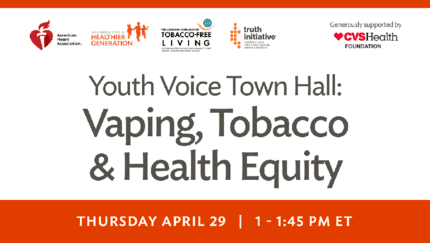
In addition to our work with schools and families, Healthier Generation partners with industry and peer organizations, at both the national and local levels, to support whole child health and promote health equity.
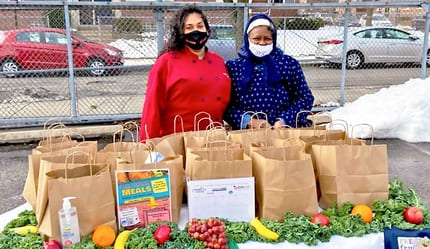
Healthier Generation continues to monitor and insist on transparent, independent evaluation of its commitments with some of the biggest names in the food and beverage industry.
Our current commitment with McDonald’s, now at the halfway mark, builds on our original 2013 agreement with new, bold steps to serve more fruit, vegetables, low-fat dairy, whole grains, lean protein, and water. The most recent third-party progress report showed that from year one to year two of the commitment, added sugars decreased by 20% and saturated fat decreased by 12% in the average nutritional profile of Happy Meal bundles.
In addition, the latest national results from the Beverage Calories Initiative with American Beverage show that the pre-pandemic trend of shifting from full-calorie to low- and no-calorie beverage choices continued. We have now observed four consecutive years of accelerating decreases in daily beverage calorie consumption. The volume of beverages purchased in that time has increased every year, indicating that the calorie decrease is the result of shifting product choices rather than a drop in beverage consumption.
To strengthen food access in response to the COVID-19 pandemic, Healthier Generation, with support from the Campbell Soup Foundation, collaborated with school-based nutrition staff to offer resources that help expand and improve access to nutritious foods for the children and families they serve. Camden City School District in New Jersey stepped up to the challenge by participating in training and technical assistance sessions to provide feedback that informed resources like Improving Food Access and Nutrition: Food Insecurity in Schools and Districts and Strategies and Practices to Improve Food Access and Nutrition Holistically.
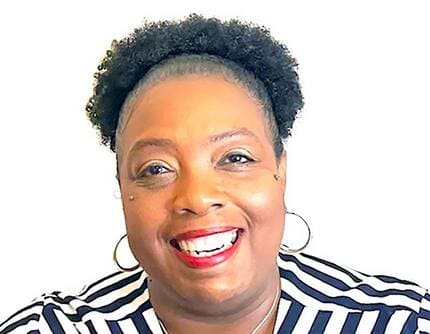
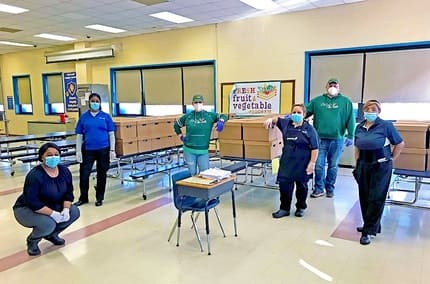
In 2021, Healthier Generation established new partnerships with over 40 organizations that are dedicated to serving BIPOC communities and highlighting youth voices, such as the Center for American Indian Health, the Center for Healing and Justice Through Sport, Salud America!, and the National Center on Health, Physical Activity and Disability.
This year, our staff presented at the ‘Ohana Family Engagement Conference, a virtual event hosted by Kamehameha Schools, Hawaii Public Schools, and Hawaii Statewide Family Engagement Centers. Following the event, Healthier Generation co-created a blog post, ‘Ohana Engagement, Haikus, and an Invitation to Reflect, and a webinar, Mindfulness and Empathy through Nature, that provided activities rooted in Hawaiian cultural practices.
Healthier Generation also featured “Mealtime Blessings,” a campaign of the Chickasaw Nation Department of Health, in Make the Most of Mealtimes. This campaign focused on families gathering and sharing a meal together and the importance of mealtime conversations for social-emotional health.
